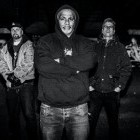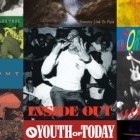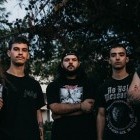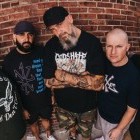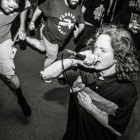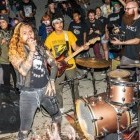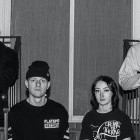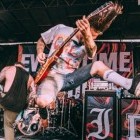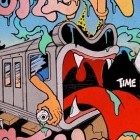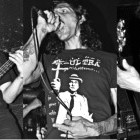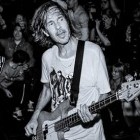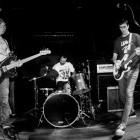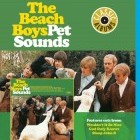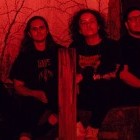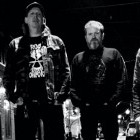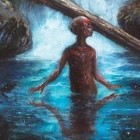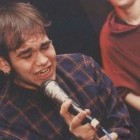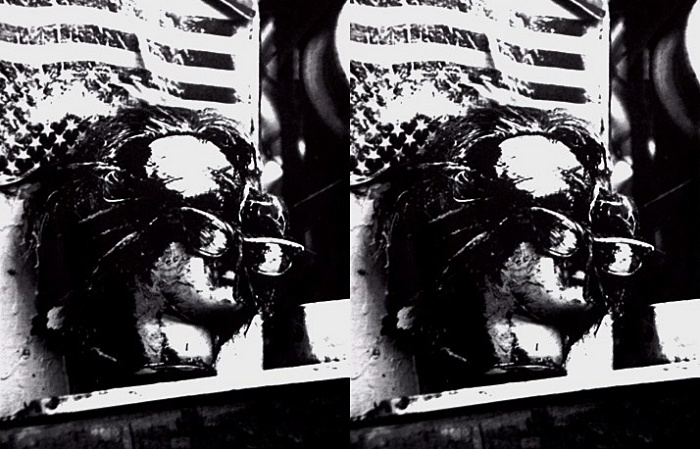
Released in 1994, the Ottawa/Jihad featured two Michigan bands spewing forth virulent hardcore in the best way possible. It didn't matter which side of the vinyl your record player's needle was gliding over, the anger tore through the speakers as intended.
Ottawa was mostly made up of members of Current, another Michigan hardcore group, while Jihad hailed from Kalamazoo. The Ottawa/Jihad split would go on to find a cult following throughout the hardcore community in the years following its release. When I was in Black Army Jacket in the mid-'90s, I remember playing the hell out of a cassette dub we had in our tour van. It's that kind of record.
When I knew I would be doing '90s Hardcore Week on the site, the idea of interviewing the folks behind the Ottawa/Jihad split (both band members and the two labels who co-released it), was one of the first things that popped into my head.
So, if you love the split as much as I do, you're welcome!
How did the idea to do the Ottawa/Jihad split come about in the first place?
Vince Averill (Abiology Records co-owner): My recollection is we were all at the second Dayton Fest (More Than Music). I knew I wanted to use the money from my high school graduation party to put out a record. Kane [O'Cathain] and I did almost everything together at this point so I assume we'd discussed doing it together. From there, I don't recall if we were talking to Jihad or Ottawa but that weekend it came together. We were friends with all those guys being from the same scene.
Kane O'Cathian (Abiology Records co-owner): The Detroit punk/hardcore scene at the time had a sister scene across the state with Kalamazoo. We’d drive to each other’s shows fairly often despite the distance. It seems like doing a split record was just a way to display all the friendships involved. Also the practicality of pooling resources and recordings that existed.
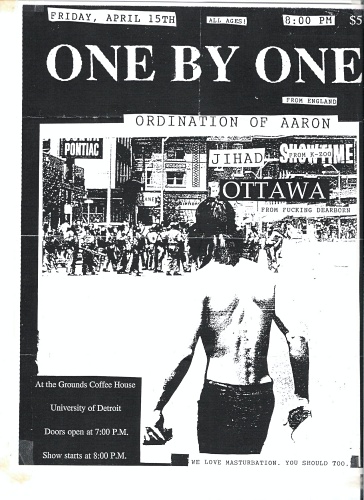
Matthias Weeks (Ottawa co-singer, Current singer, Council Records owner): We recorded the Ottawa tracks in early 1994 with no real plans for them at first. We gave one compilation song to Martin [Sorrondeguy] for the Lengua Armada compilation, A History of Compassion and Justice. Los Crudos were working on a split with Dropdead, if I recall, but there were some issues causing delay. We had a few brief discussions about doing a Los Crudos/Ottawa split LP with their tracks, but there was some trouble retrieving them, so it never went anywhere (the Los Crudos songs ended up being on the split with Spitboy, I think).
Current went on tour in May/June of 1994 with the Ottawa tape in tow. It made the rounds, and by the end of those two months, we met back up with Vince and Kane at the More Than Music festival in Dayton. They had been eager to start a label together, and it just seemed to make sense. We had gotten to know several of the Kalamazoo bands over the past 2 years, and we liked the idea of tying both sides of the state together with the split. Jihad were a brand-new band at the time, and Vince and Kane were already looking at releasing something by them.
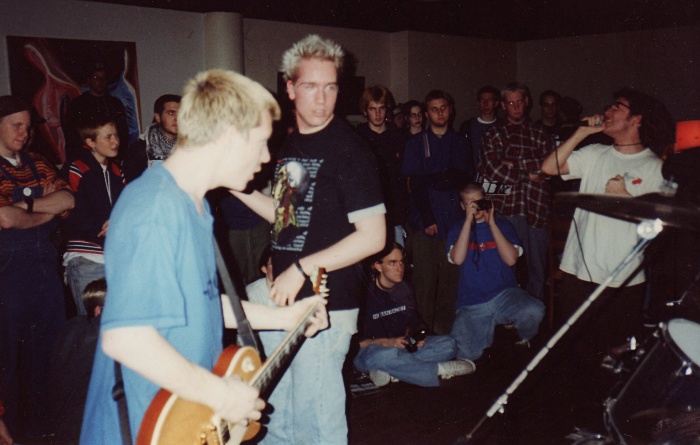
In the hardcore community, especially if you’re in our age group, Jihad and Ottawa are synonymous with each other thanks to the split. Tell me a bit about the friendship both bands shared. Was the Michigan hardcore scene a close one?
Derek Brosch (Ottawa drummer, Current drummer): Detroit and Kalamazoo were about 2 hours apart so there were a lot of shows between bands on both sides of Western and Eastern side of Michigan. We were friends with Joel Wick and Derek Kenny (both members of Jihad). Kalamazoo bands played in Detroit and Current played in Kalamazoo many times. The only Ottawa moments i can remember from Kalamazoo was during a Current show in a basement. We finished out set and then set up to play our 'new project called Ottawa'. We played 2 songs, i think, and saw a lot of stunned faces.
Why did the project end up being done as a split label release?
Kane O'Cathian (Abiology Records co-owner): It’s all a result of the DIY punk/hardcore scene at the time. I know for my part, the scene was such a huge part of my life and I was excited to be able to contribute. Doing things like helping run shows, writing zines, and things like that. Putting out a record was something that was attainable fully DIY with so many thriving distros in existence then. The only large barrier was coming up with the money for the actual pressing.
A split label made sense because we could distribute that burden across 3+ people and keep the wholesale margin super low (as per the ethos of the time). Vince and I pooled our high school graduation money together to form our label (Abiology) while Matt recycled the money from previous releases on his label (Council).
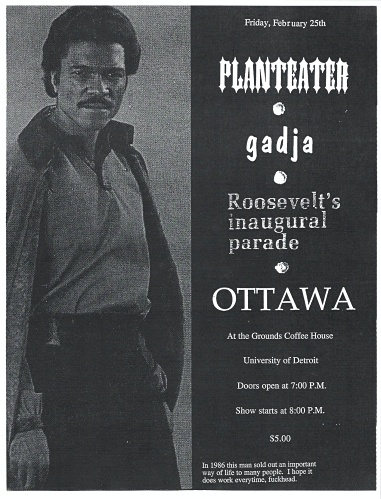
Tell me about the Jihad material on the split.
Derek Kenney (Jihad guitarist): The material on the Ottawa/Jihad split was never planned for that record. Jihad had been around several months at the time we recorded those tracks. We wanted to put out a demo, and get a better sounding recording to share with our friends.
We weren't really thinking beyond that at the time. We lived in Kalamazoo, MI, which had a thriving scene, but still was mostly locals playing for each other, and some of the Detroit bands.
The lyrics and ideals of the band were the same across all of the the records. We were angry, and had something to say. In the late '80s and early '90s, there were lots of bands that were doing crossover metal or tough-guy hardcore. We liked Youth of Today, BOLD, and bands like that, but we were a bunch of squares that didn't identify with that scene.
Also, at that time, you had the first Gulf War. Joel and I were draft age at the time. We lived in a redneck town where most people supported the war, and were heavily patriotic. We were openly against it. Then we hear Born Against and these other bands and find that the kind of punk we believed in was out there. The personalities were already their before we started the band. Jihad became the way we vocalized our ideals.
Joel Wick (Jihad bassist): [Jihad vocalist] Craig [LaCombe] and I loved Laughing Hyenas, Jesus Lizard, and alot of the Touch and Go/AmRep stuff. I think we were always trying to sneak some of that influence in there somewhere, somehow. I'm sure there's several bands I am forgetting, but you get the idea. I myself was always heavily influenced by Crass, Dead Kennedys, early Black Flag, Septic Death, Christ on Parade, Lungfish, 7 Seconds, The Birthday Party, The Avengers, 4AD Records, Bauhaus, Swiz, Bikini Kill, Nation of Ulysses, and a few others before and during those times.
Punk rock always meant alot to me and has impacted my life to this day. I'm eternally grateful for all the involvement and experiences I have had.
Tell me a bit about the Ottawa material on the split. What kinds of themes were you guys tackling on the songs?
Jeff Rice (Ottawa co-singer): We'd all been seeing a lot of Los Crudos and Dropdead and listening to a lot of stuff like Crossed Out, Man is the Bastard, Infest, Napalm Death, Conflict, and Discharge. That's where the songs were coming from—sometimes directly, since I remember totally copying Dropdead when coming up with vocals on "Holy of Holies." It was pretty rare that you'd see a band playing fast at a hardcore show in an era where hardcore meant mosh metal or emo, so I think Ottawa was kind of a response to that.
It was also a response to a bad review that Current had gotten in Maximum Rocknroll for not being fast enough!
As for the themes, they were pretty much a grab bag of stuff we hated and loved. Mostly stuff we hated. We hated Christianity, domestic abuse, homophobia, war, and the oppression of the lower classes. We loved J.R.R. Tolkien.
What's the story behind the cover art to the split?
Kane O'Cathian (Abiology Records co-owner): Creating the cover artwork was a collaborative effort between the labels and many of the band members. I had a bunch of blurry and overexposed photos of the Heidelberg Project I’d taken on a camera I’d stolen from my work that were used for the cover. The rest of it was from a Kinkos cut and paste session from shit we dumped out of our backpacks.
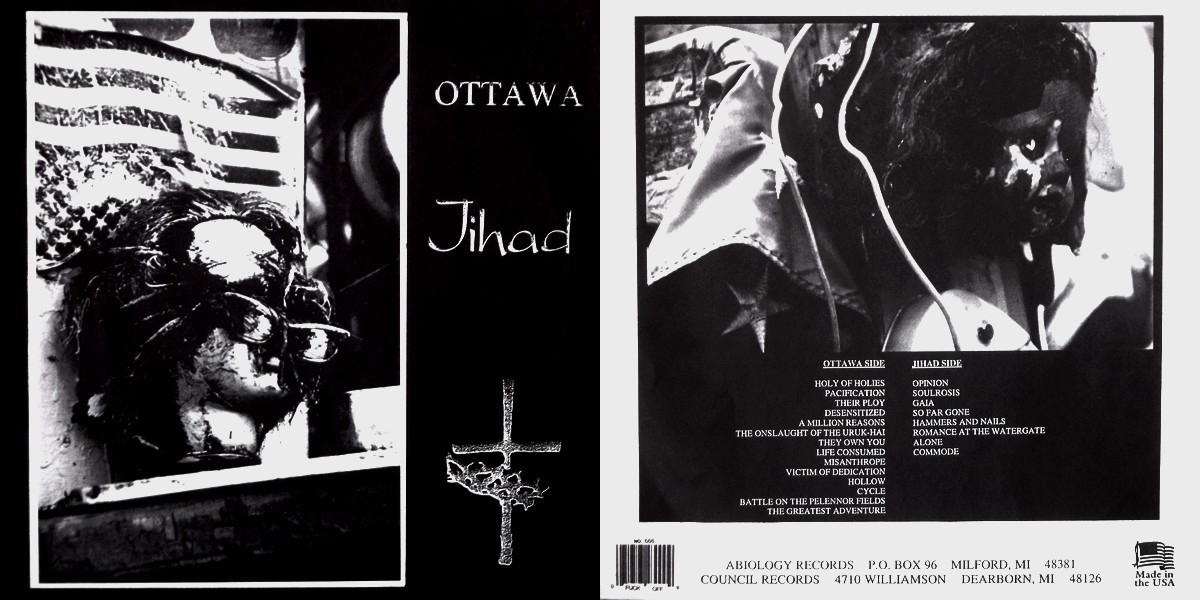
The inserts were created by the bands to round out the '90s practice of stuffing as much as you could into a record sleeve. All of these things had slight changes over the different iterations/pressings.
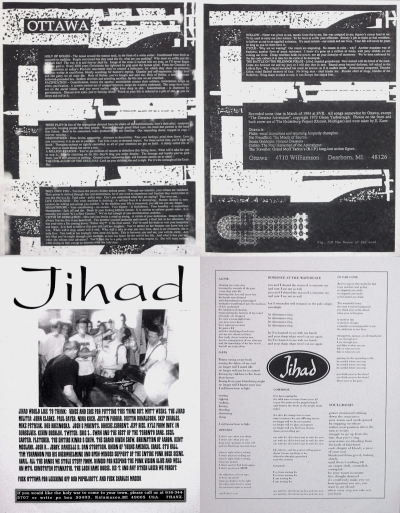
Did the pressing/production of the actual records go smoothly?
Vince Averill (Abiology Records co-owner): Archer Records in Detroit was a nightmare. Delays, records that we almost flexi thin. Threats. I recall there was a single copy on Green or something like that.
Matthias Weeks (Ottawa co-singer, Current singer, Council Records owner): We were excited to learn of a pressing plant in Detroit and were hoping to establish a relationship with them to keep production local and shipping costs down. Sadly, that was not meant to be. The first pressing of the Ottawa/Jihad LP was a mess. Vinyl thicknesses ranged from flexi to sawblade. We ended up going through the entire pressing by hand, pulling out 300-400 records and took them back to the pressing plant to redo. The owner told us to “shove them up our ass”. Several words were exchange and he eventually agreed to repress them, but that was the only project we ever did with them.
The only positive thing to come out of all that – when going through the 1st press, we found 4 copies on green vinyl. Those were the only color copies in existence [see photo below]:
From your standpoint, what do you remember the response to the record being like? I remember the split becoming really popular among my circle of friends in the NYC/Long Island/NJ area. Did you feel that on your end?
Justin Labo (Ottawa guitarist): I remember the response to the record being pretty good. But, we only played maybe 4 or 5 shows in a very short window of time, so it was hard to gauge the response outside of our immediate group of friends/scene. I definitely remember we were super happy Maximum Rocknroll gave it a good review. That was nice. They had previously slammed a Current record, which bummed us out. We didn’t know it was popular on the East Coast at all. That’s crazy.
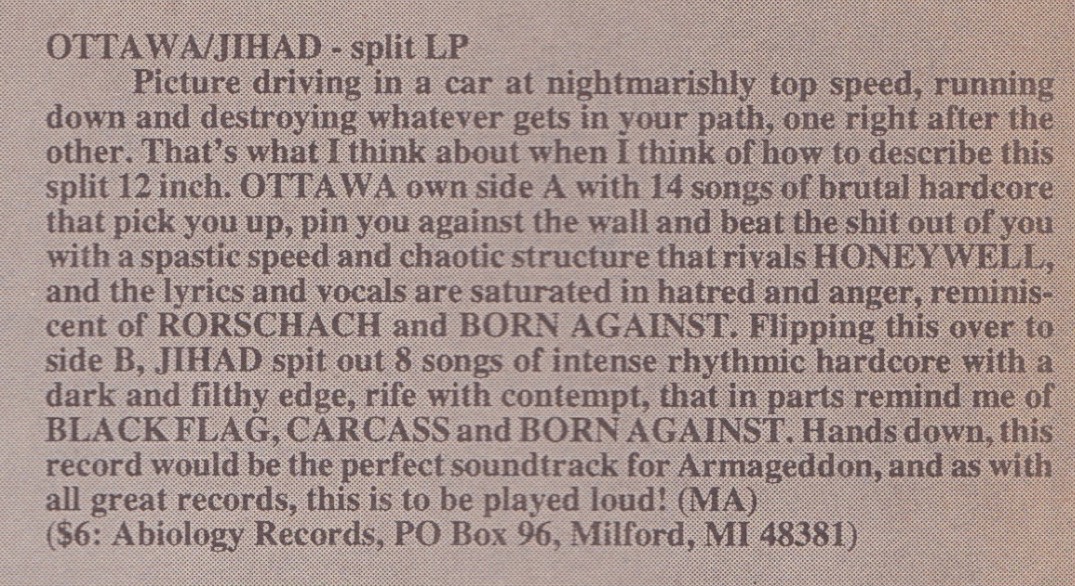
Vince Averill (Abiology Records co-owner): In those days a good review in Maximum Rocknroll could seal a record. Ottawa's demo which would ultimately be their side of the record had been heralded, and Jihad had also at least in our neck of the woods and probably beyond been getting a great response. By the time it came out, Kane and I were sharing a dorm room at college and I know we had a drawer full of cash (you know in those days cash/money orders, no checks and if you soaped your stamps for reuse even better). It got an overwhelming response.
Why did Ottawa end up breaking up? Do you feel like it might have been premature?
Justin Labo (Ottawa guitarist): Ottawa never really broke up as we never really were an actual band. We were 4 members of Current and Jeff Rice on second vocals. We had songs and we recorded the songs. The songs came up live at various times during 1994 and a couple actual Ottawa shows happened.
Ottawa never "broke up" but was more collateral damage once Current was winding down. We played one final show after the split LP was released but that was the end.
In summer of 2000, we had booked time in a studio to remix the LP as we were never happy with the mix. We had the intention of recording some additional songs but life got in the way and Justin was unable to make it back. It might have been good..or shitty..we have to file it under "What if..."
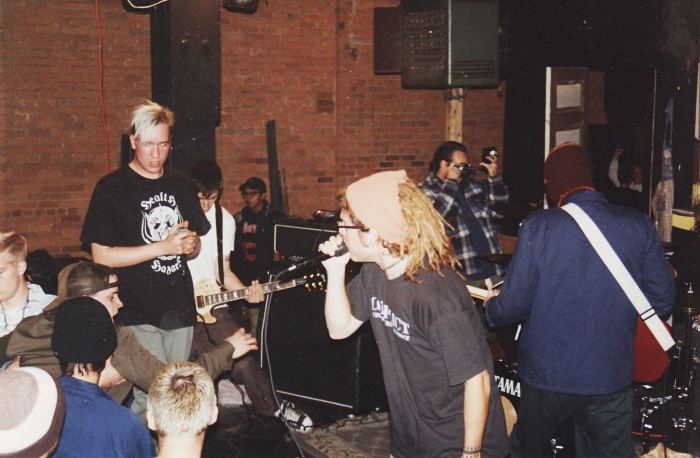
Why did Jihad end up breaking up?
Derek Kenney (Jihad guitarist): We actually broke up twice. The first time I think came out of frustration we were having with the original drummer. He was just this 16-year-old kid, and were trying to convince his parents to let him go play 5 hours away on a school night. It just wasn't working out. Joel ended it, but then a year later we got back together with Matt G playing drums. That guy was phenomenal. I didn't even really know him, and he comes walking into my work one day and said "I'm Jihad's new drummer, when we practicing?"
When we broke up it put me in deep depression for a few years. Not just the band breaking up, but the end of these meaningful friendships, my identity, and leaving Kalamazoo, I moved around to different places trying to feel at home again. I truly feel like we loved one another, and had each other's backs even when things weren't going well between us. 20 years later I still can remember a time when Craig and Matt were there for me in a meaningful way. Joel was my partner in crime, I can't even count how many times that guy was in my corner when I got myself into trouble. I picked a fight with Earth Crisis, Joel was the first one to step up and defend me. I was having some stupid argument in my apartment with Race Traitor over our name, and here comes Joel walking into my apartment.
The reason I'm sharing these more intimate details and stories is to illustrate how could we have gone on much longer than we did. Our relationships, the band, and each of us having our weird personality issues made it a very intense social dynamic. I wouldn't change any of it, but it wasn't meant to last.
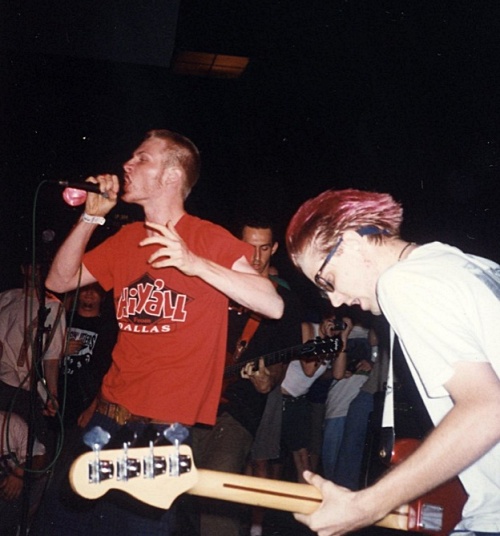
Joel Wick (Jihad bassist): I mean, we were young, we were passionate, we were motivated, we were naive, we were super emotional. We were 4 distinct individuals. I cherish everything I went through with all the members of Jihad. We had ups, downs, and definitely everything in between. Ultimately, that is going to cause distress and tension, and I think it just ran its course. I think we all might have been a little bit stubborn (me included for sure), and I'm sure that played a part. I don't think it was premature from what I remember, but I'm only 1/4th of the story. I don't remember all the details, but I know there was tension around which direction we wanted to go.
There was some talk of trying to get on Victory Records, and that was just not my thing at all. I was not interested in pursuing that in any way, so I expressed my feelings about that. That certainly contributed, and I was also running a label at the time, in another band, promoting shows, and working full time. It had lost it's initial energy and passion, and it just didn't feel right to me. I remember thinking at the time, that I felt if I continued it would be insincere of me. I had no problem if they wanted to continue without me, I just was going to remove myself from the situation.
Looking back all these years later, why do you think the split is still talked about? Outside of the actual music, is there something else you think has contributed to its legacy?
Justin Labo (Ottawa guitarist): I want to say it’s because we were only around for a minute and there was maybe some mystery about the band and whatnot. But who knows?
Joel Wick (Jihad bassist): Ok, to be honest, I'm not sure why it's still talked about. I don't consider it a classic hardcore record in my mind, but I'm pretty picky. I mean, the Ottawa side is pure brilliance, let's be honest. That split would be nothing if it would have been another band other than them, save for maybe The Laughing Hyenas or Infest. The combination of those individuals at that time created one of the most intense live bands I had ever seen. They were legit.
Yeah, I think the Jihad side is pretty good, but it could have been lots better. The record itself was short, sweet, to the point and minimalist. We definitely wanted it to be black and white, as we felt it was important to the aesthetic. It had enough of an effect on a fair amount of people, and they all have pretty good memories. I think the fact that it was a split and 12" at 45rpm, with an in your face production and attitude, helps to contribute to the blunt effect of it. That's about all I got on this question.
Derek Brosch (Ottawa drummer, Current drummer): I really don't know how that record had such legs. Metal and hardcore was where my musical love had always been, so Ottawa holds a very special place for me. Getting to play 1-minute bits of bombastic whirlwind noise and having it released on a 12" and have people still talk about it 25 years later is pretty great. In the end they were just good songs that came about from the blender of music influences we shared.
We didn't put a lot into it and we didn't keep it going as a band so it never had a chance to suck and that might as been for the best. We also didn't use our actual names on the record cover so maybe it had a mystery element to it. The world may never know who the real Snake Goldstein is.
Kane O'Cathian (Abiology Records co-owner): I think that it was something unique enough for the time and audience that it had a sustained popularity. Ottawa, being Current’s alter ego reaction to the Maximum Rocknroll review policy, had an impetus to sound a particular way. I think this angrier straightforward sound played by the same people who were known for making meandering, soft to loud songs brought its own impact with it. I think the story of Ottawa appealed across some scene barriers. Where it was connected to a scene around Current of a more emo (please forgive the loaded term, but put in the historical context still fits) set - the music came from a more punk/crust direction. It seemed like both of these typically opposed sub-scene tastes came to really love Ottawa.
Jihad, on the other hand, serves more as an encapsulation of music trends at the time. You have the heavy chugga chugga of contemporary New York hardcore, without soundling or acting like an Earth Crisis clone. Mixed that with the metal influences that were making their way back into hardcore in good ways after the disasterous results of the crossover era. Plus, a Jihad show was always over the top fun as people were in the pit to have fun, not display how tough they were. I don’t know that any of the love of the split comes from legends of Jihad’s live antics, but I think it should.
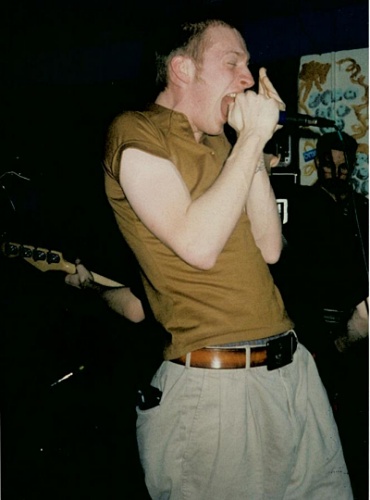
Matthias Weeks (Ottawa co-singer, Current singer, Council Records owner): Aside from the music, I think Ottawa arrived at a good time. In the early '90s things were swinging back around to ugly, fast, politically-charged hardcore and we just landed at the right time. There is some mystique to the band, since it really didn’t exist, and in some ways, it was more of a reaction than an actual band. I think it coming from essentially the same people that did Current had something to do with it.
Not many bands had such different alternate manifestations existing side by side. Things felt more connected back then. Current toured with Rorschach for a couple of weeks. It didn’t feel like such a stretch to go from Rites of Spring to Crossed Out without skipping a beat.
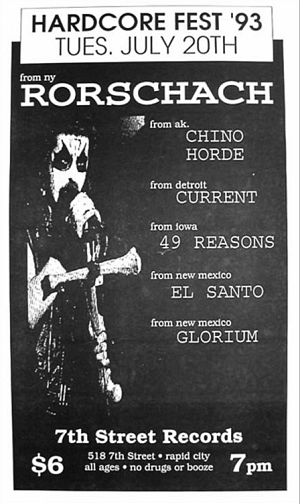
Derek Kenney (Jihad guitarist): I say 90% of that records legacy is Ottawa. Not only were they an amazing band, but the origin story is legend. Most people know the story, but the short of it is Tim Yohannon said Current weren't punk, and gave them a shitty review in Maximum Rocknroll. Those guys were punk as fuck. Ottawa was Current with a second singer. If I remember it right, the idea was to keep who Ottawa were a secret, put out the split, and when MRR lost their shit over Ottawa that would be the ultimate fuck you. That is how I remember the story, and it's a great one.
The Jihad songs were good, but I think the name and aesthetic matched with Ottawa made/make it this record that you would probably hide from your parents. Both bands were bombastic. I don't think any song lasts longer than two minutes. You have this offensive name, with pictures of twisted baby doll heads, and Hezbola marching with RPGs.
Vince Averill (Abiology Records co-owner): I think everything just lined up, and like many great bands they were both over before they started. Kane and I never did another record together. They were not the same style bands but they each did their style really well. There's just a mystique around it.
I remember walking into a random bar in New York in maybe 2007 and the DJ was just playing an Ottawa song. Fucking wild.
***
Donate a few bucks to help with No Echo's operating costs:
***
Tagged: 90s hardcore week, current, jihad, ottawa

